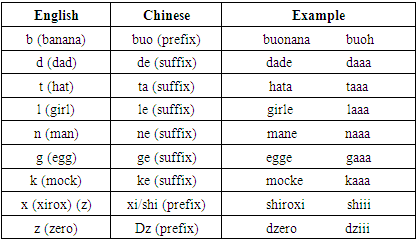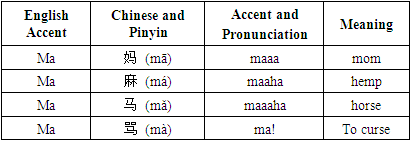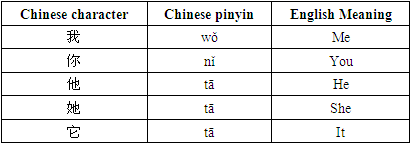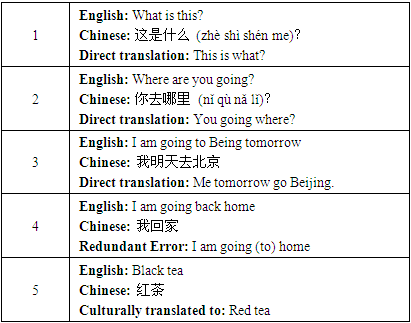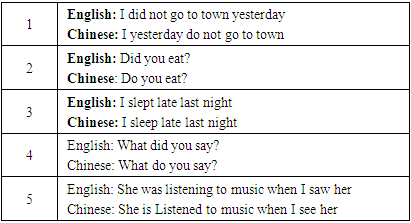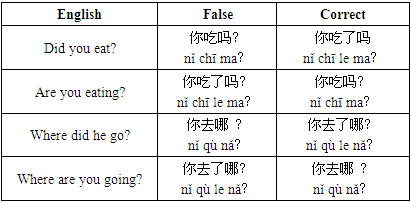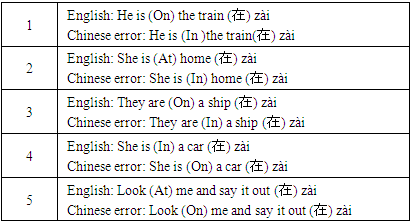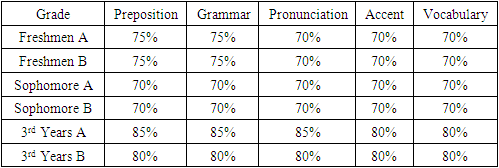-
Paper Information
- Next Paper
- Paper Submission
-
Journal Information
- About This Journal
- Editorial Board
- Current Issue
- Archive
- Author Guidelines
- Contact Us
International Journal of Psychology and Behavioral Sciences
p-ISSN: 2163-1948 e-ISSN: 2163-1956
2024; 14(1): 1-10
doi:10.5923/j.ijpbs.20241401.01
Received: Dec. 28, 2023; Accepted: Jan. 18, 2024; Published: Jan. 23, 2024

What Challenges and Difficulties Do Chinese College Students Face When Learning EFL?
Itayi Artwell Mareya
Department of Foreign Languages, Hanjiang Normal University, Shiyan City, Hubei, China
Correspondence to: Itayi Artwell Mareya, Department of Foreign Languages, Hanjiang Normal University, Shiyan City, Hubei, China.
| Email: |  |
Copyright © 2024 The Author(s). Published by Scientific & Academic Publishing.
This work is licensed under the Creative Commons Attribution International License (CC BY).
http://creativecommons.org/licenses/by/4.0/

Even though the development of China has paved way for great opportunities for many Chinese nationals to travel abroad, study abroad, work abroad and also attracting many Chinese College students to learn English, still a lot of challenges and difficulties looks infinitive. Among the challenges and difficulties found out during a research carried out at Hanjiang Normal University included grammar, vocabulary and pronunciation as the most difficult elements. The main cause being that of the influence of the mother tongue and Chinese grammar pattern which is very different from that of English compounded with lack of comparative teaching of English and Chinese grammar. Questionnaires were distributed to 6 classes comprised of first, second and third year students of English major at Hanjiang Normal University with the aim of attempting to find the challenges, difficulties and their causes in learning EFL. Discussions were carried out in class in the form of group presentations. Most of these students had 9-10 years of learning English as a Foreign language but still did not possess the basic fundamentals that produces the students’ anticipated proficient levels.
Keywords: Challenges, Difficulties, Chinese College Students, EFL
Cite this paper: Itayi Artwell Mareya, What Challenges and Difficulties Do Chinese College Students Face When Learning EFL?, International Journal of Psychology and Behavioral Sciences, Vol. 14 No. 1, 2024, pp. 1-10. doi: 10.5923/j.ijpbs.20241401.01.
Article Outline
1. Introduction
- In the quest of excelling in English language, Chinese College students for the past many years have moved from a lower level to a moderate level in their fluency. This is Chinese Government’s aspiration to produce a generation of Chinese people who can converse in foreign languages and English is the most preferred among other languages such as German, French, Portuguese, Arabic and Spanish. Even though Chinese is the world ‘s most spoken language but English is the most widely used language in the world spoken in over 60 countries as official language while over 1.4 billion people in the world speak Chinese language The rising of Chinese economy and it’s influence in global politics has seen many Chinese parents wanting their children to learn English as the favorite Second language. This has arisen as a gateway to many opportunities that are brought about by being associated with the international community either as in business, studying abroad or travelling abroad. Bai J (1991) confirms that the increase in Chinese students in high schools and tertiary levels had a sharp increase while the at secondary and tertiary institutions students are allowed to choose only one foreign language. Most students are assumed to choose English. Yang and Gui (1982) asserts that in the 80s China had over than 60 million students in the secondary and tertiary levels learning English. The students medium of instruction is discussed by Gates (1947) and also by Biggs (1981) as cited by Bai J (1991) as teacher instruction and individual instruction. These authors also asserts that the strengths of the Chinese students in learning English varied from some having the knowledge of syntax and others having the knowledge of vocabulary. Bin Ai (2015) asserts that Chinese students learning EFL faces some challenges in writing. This survey was aimed at exploring the challenges and difficulties faced by Chinese College students when learning EFL. The survey was carried at Hanjiang Normal University in the autumn Semester of the year 2023 from the freshmen students, sophomore students and the third year students whose major is English. The major challenges observed from these students varied from their different levels of education. The freshmen classes faced pronunciation problems while the sophomore classes faced problems with the vocabulary. The third year students mainly faced problems with grammar and translation. Most of these problems are not unique in Chinese circular universities because Chinese model of learning is usually not different from one institute of learning to another although in few cases whereby the involvement of some foreign experts may be a contributing factor and especially in primary schools where very few foreign teachers can be found teaching. A bunch of foreign experts be it natives or non natives are usually found in the Kindergartens because of the attractive salaries. Middle schools and high schools may have very few foreign experts because of low salaries. In Chinese Colleges and Universities the number of foreign teachers is moderate because of the lack of higher qualification by most of the foreign experts. Regardless of all the above mentioned reasons one of the forbidding reason at the moment in China is the way how China is currently portrayed in the West since the appearance of COVID 19 in the world and the strictness of the lock downs that were characterized in China that found many foreign experts losing their jobs with great uncertainty. In general most of the students had their own different challenges caused by many reasons among them the lack of vocabulary learning, lack of grammar lessons and lack of spoken environment. In this regard I have come up with a few recommendation that fosters to eliminate these challenges and difficulties in the learning of EFL by Chinese College students. One of the recommendation to specifically mention is the introduction of comparative studying of English and Chinese grammar pattern. The rest of the recommendations shall be listed in the end.
2. Overview
2.1. Listening
- In Chinese the word (listening) is described into four variables and that is depending on the nature and mode of listening. The first meaning of listening in Chinese is regarded as;• 听闻 (tīnɡ wén) which means to listen from what one hears.• 听说 (tīnɡ shuō) means (hearsay) or listening and speaking.• 听力 (tīnɡ lì) meaning the ability to listen or listening ability.• 听力理解
 meaning listening comprehension.According to Li Fu et al (2012) believes that creating an opportunity towards willingness to communicate in Chinese students in their English classes helps a lot in the improvement of their EFL studies. Listening comes in the process of two people talking together. Recording and decoding of information is very important in communication. Most Chinese College students at Hanjiang Normal University which is located some 150 km away from Wuhan the capital city of Hubei is are not very familiar with foreigners. Shiyan is a small city which attracts very few foreign students or foreign experts thereby creating an environment that sees no opportunity for the students to interact in English. Previously the University had once had a foreign English teacher from Australia who could not speak or understand even a little Chinese therefore resulting in the students failing to understand whatever the teacher was teaching or saying. The usual outcome from lack of listening results in misinterpretation of a situation or discussion. Misrepresentation of facts or issues also arises due to misunderstandings caused by lack of listening abilities. Listening from someone speaking a foreign language is usually enhanced by the listener’s ability to catch up with the speaker’s usage of vocabulary, pronunciation, accent and grammar pattern. Chinese language word pronunciation, accent and grammar pattern are all very different from that of English language. This shows how difficult it is for Chinese students to learn English.
meaning listening comprehension.According to Li Fu et al (2012) believes that creating an opportunity towards willingness to communicate in Chinese students in their English classes helps a lot in the improvement of their EFL studies. Listening comes in the process of two people talking together. Recording and decoding of information is very important in communication. Most Chinese College students at Hanjiang Normal University which is located some 150 km away from Wuhan the capital city of Hubei is are not very familiar with foreigners. Shiyan is a small city which attracts very few foreign students or foreign experts thereby creating an environment that sees no opportunity for the students to interact in English. Previously the University had once had a foreign English teacher from Australia who could not speak or understand even a little Chinese therefore resulting in the students failing to understand whatever the teacher was teaching or saying. The usual outcome from lack of listening results in misinterpretation of a situation or discussion. Misrepresentation of facts or issues also arises due to misunderstandings caused by lack of listening abilities. Listening from someone speaking a foreign language is usually enhanced by the listener’s ability to catch up with the speaker’s usage of vocabulary, pronunciation, accent and grammar pattern. Chinese language word pronunciation, accent and grammar pattern are all very different from that of English language. This shows how difficult it is for Chinese students to learn English.2.2. Speaking
- Amoah Sand Yeboah J (2021) asserts that speaking is the most fundamental aspect in learning a Second Language but also viewed as the most difficult task of all other aspects.Speaking Chinese is like singing a song. A person can be misled on how Chinese people speak. You may think they are shouting or quarreling to each other while they are just speaking politely. According to Zhengqiong D and Yanren D (2010) believes that the learning of a Second Language through text memorization as controversial. According to Cook (1994) learning through memorization is an outlaw. However Chinese students regardless of what subject of study they learn everything is done through memorization of text from Kindergarten to University. The problems that arise from such a learning methodology is that if you ask Chinese students about what they have not memorized they find it difficult to speak. Pennycook (1996), p 222 cites Biggs (1991) that Chinese students studying abroad are often times regarded as ‘note learners’. The Chinese students of English major from the first years, second and third years at Hanjiang Normal University shows no difference from all other Chinese students elsewhere as far as memorization of text is concerned. Zhenhui R (2010) asserts that the ill-informed of many English Native Speaking Teachers (ENST) to Chinese culture, educational systems and sensitive issues in their teaching is also a contributing factor that restricts Chinese students from speaking English well. The lack of basic Chinese language in Foreign Experts teaching English makes it very difficult for Chinese students to fully understand their English teachers therefore such obstacles makes it very difficult for Chinese students to like (ENST) ‘s classes. Naturally Chinese students like most Chinese people are very shy to speak English in fear of being looked down upon by the hearers who may assume their English is not perfect. Chinese people fear to be found on the wrong side of the right way of things. The feeling of dominance by the (ENST) on other people of the world is also the obstacle they found in the Chinese students who feel that they must be respected in some way. Chinese students do not fear having an English class being contacted by a non native speaker whom they perceive to be more friendly and flexible. Zhenhui R (2001) in his findings concludes by saying that activities that involves more communicative linguistics needs more attention in Chinese Universities’ EFL classes so as to increase the students’ speaking capabilities and proficiency. Such activities may include Debates, games, impromptu speeches etc.
2.2.1. Pronunciation
- Pronunciation of a foreign language is not only a problem with Chinese people and students but a world phenomena. Many people have seen and witnessed many international leaders failing to pronounce well some English words at world forums. Some examples which were given by the students during the survey about some international dignitaries whose English pronunciation is not well are; United Nations Secretary General (Antonio Gutreres), The World Health Organization Secretary General (Tedros Adhanom Gebreyesus) and the NATO Secretary General (Jens Stoltenberg) to name but a few. The main attributing factor to the failing to give standard pronunciation of English words by Chinese University students especially by those at Hanjiang Normal University has been due to various reasons. The first year students makes the majority due of the students because the most time they spent in primary, middle and high school environment has no enough access of meeting foreign teachers or Chinese English teachers who would have studied abroad to give more exposure to English word pronunciation. Another contributing factor was the influence of the mother language which carries other different pronunciation of certain letters and words far different from those in English.
|
2.2.2. Accent
- Chinese language is made up of 4 different tones. The following are the 4 tones in use.
|
2.3. Reading
- According to Bai J (1991) citing Samuels and Kamil (1984)’s psychometric model asserts that reading is consisted of sub skills. This model is but described by Singer (1985) as cited by Bai J (1991) as ‘developmental model’. The two authors also describe reading as a very complex issue. In Chinese Universities, students of English majors also have been facing reading complications as far as learning EFL. This has been due to the influence of bad pronunciation, bad accent and deficiency of vocabulary. This research has found out that most of the freshman students read much better as compared to the second and third year students. The reasons for this unusual development will be fully discussed in the next chapters, however the main reason has been that in high school students study more hard and more serious in order to pass the high school exams for them to enter into university. There is this sentiment that most of the Chinese people and parents believe that Chinese’s high school exam is the most hardest and painful exam in the world. Most of the students and parents go through very hard moments at this moment of time. Some unofficial reports purport that some students in China commit suicide before, during or after the high school exam. Unlike at University level most students feel more relaxed therefore their performance decreases a bit especially in reading and speaking.
|
2.4. Writing
- According to table 2.3 shown above “writing” is the least difficult aspect in the learning of EFL by Chinese University students. The difficulty part was usually impacted by less knowledge of vocabulary as shown by the general result of the freshman students. For the sophomore and the third year students writing was more easier because at the moment of study they would have mastered a lot of vocabulary. Regardless that writing English is far more different from writing Chinese characters, the Chinese students finds it more easier to write English than Chinese because Chinese is also has another version of writing it and that’s through using “pinyin” which is almost the same as like writing English. Pinyin is practiced right during the kindergarten level where Chinese kids learn how to pronounce Chinese words.
|
2.5. Grammar
- Chengyu N (2015) asserts that teaching grammar of a foreign language is a very positive role. The same author also cites Celce-Murcia (1994) whose views shows the essential part of teaching foreign language grammar in the sense of the impossibilities of separating grammar from the meaning of any language in interaction. The role of grammar in teaching EFL is not only required but a necessity. Even though there are a lot of varieties in the modes of teaching grammar such as those mentioned by Chengyu N (2015) ibid which includes skills /knowledge mode, integrated or separated modes, it is still a very long way for Chinese College students of English major to fully understand English grammar. The reason of the Chinese students’ failure and inconsistent with English grammar has been attributed to the great differences between English grammar and Chinese grammar. According to Claudia R et al (2017) the Chinese word order, phrases and sentence structure is all totally different from that of English grammar. Zhou Z (2017) as cited by Anggrawan A et al (2019) asserts that English grammar teaching has also shifted to English grammar learning through the usage of different approaches. Anggrawan et al (2019) believes that the deficiency and lack of attention as far as English grammar teaching is concerned has led to lot of failures in the learning of EFL by College students. In her comparative study of Chinese and English grammar Show-Chi (1982) observed that it was only in recent time where Chinese /Mandarin grammatical structure concept had become so pervasive. Lightbrown (1991) cited by Emel Akay and Cetin Toraman (2015) asserts that grammar is used as a “hook” to the English learners so as to build their foundation for proficiency. Emel A and Cetic T (2015) citing Krashen (1982) who believed that grammar was just a phenomenon and that it can be acquired by natural means. This research will also in the next chapters attempt to show the performance of the Chinese College students whose major is English their performance in articulating English grammar.
|
2.5.1. Present and Past Participle
- Many Chinese College students of English major at Hanjiang Normal University face some challenges and difficulties in dealing with the past and present participle grammar order. A few examples to take a glimpse of this problem in general. These are just common errors which Chinese students usually commit when using past tenses.
|
|
2.5.2. Preposition
- The most common used Chinese preposition is “在 (zài)” which mainly means, (At, In, or On (a place or time). 在 (zài) can also be used as a verb or as an adverb. When using it as a preposition Chinese students makes more English grammatical errors. As one can see that one Chinese preposition such as. 在 (zài) can have three different meanings as a preposition Chinese students find it challenging to separately use (At, In or On) prepositions.
|
2.5.3. Sentence Construction
- English and Chinese sentence construction is a typical example of the big difference between the West and the East. It does not only show the differences of the two languages’ sentence construction but also show many differences in translation and comprehension as well as vocabulary. The following are some examples that helps the reader to understand some of the simple sentence construction differences between English and Chinese sentence construction;1. English: I won’t come tomorrow. This English sentence is constructed as follows (Subject >Object and Time).Chinese: I tomorrow won’t come. Chinese sentence is constructed as follows; (Subject> Time> Object) 我明天不来
 2. English: Where do you come from? The Chinese sentence is therefore as follows; (You from where come? 你从哪里来的
2. English: Where do you come from? The Chinese sentence is therefore as follows; (You from where come? 你从哪里来的  ?3. English: Did you eat? In Chinese the sentence is grammatically constructed as; You eat did? 你吃了吗
?3. English: Did you eat? In Chinese the sentence is grammatically constructed as; You eat did? 你吃了吗  ? These types of mixed and disorder errors are very common in Chinese College students when learning EFL grammar.These kinds of grammatical errors can only be avoided by emphasis of teaching English grammar to Chinese College students apart from the emphasis on common spoken lessons which usually ends up with students who assume to be good English speakers whilst making lot of grammatical errors that eventually results in misunderstandings in communication.
? These types of mixed and disorder errors are very common in Chinese College students when learning EFL grammar.These kinds of grammatical errors can only be avoided by emphasis of teaching English grammar to Chinese College students apart from the emphasis on common spoken lessons which usually ends up with students who assume to be good English speakers whilst making lot of grammatical errors that eventually results in misunderstandings in communication.2.6. Comprehension
- One of the most difficult part of EFL learning by Chinese College students of English major is the comprehension element either be it narrating, writing, reading, describing, commending, analyzing, or just understanding it. Reciting or memorization of texts is the biggest way Chinese students learn in school. This way of learning by Chinese students can not change soon because it’s taught right from the Kindergarten level on how to master the Chinese characters. During some of my classes on how to teach mastering comprehensions I had to employ tactics such as making the students to repeat and repeat the text until they could understand the meaning of the text. By this way many of the students were now able to grasp the basic meaning of a comprehension unlike if the students were given a homework to comment on a comprehension, the students would only but go and recite the whole text and come to class and repeat the whole text.
2.7. Translation
- Translation is a very difficult part of learning a foreign language. Shih-Chuan Chang (2011) found that “Grammar Translation Method” is much better as compared to “Communicative Approach” as far as translation of English learning in China is concerned. The author believes “Communicative Approach” is concerned with the fluency of English whist the “Grammar Translation Method” is concerned with the accuracy part of grammar translation. In an upcoming research on translation the researcher intends to explore the challenges of posters and billboards in the streets of Shiyan city where the researcher has found out that many errors and mistakes appear in the translation of Chinese language into English. Translation is a very difficult task in Chinese Colleges because of the recent usage of translation software that falsely translate certain text thereby misleading many Chinese College students to do their best in the field of translation. However Shu-Chiao Tsai (2022) asserts that many EFL College students in China believes that Google Translator is more proficient as compared to many other translation software. Translation of Chinese language into English is not an easy task due to the deep differences in grammar and sentence construction. Most of the translation errors committed by the Chinese students are mainly attributed to the influence of Chinese as the mother tongue, grammar pattern which is usually is as a result of direct transliteration and lack of knowledge of some English vocabulary.
2.8. Vocabulary
- Mastering English vocabulary is no easy task especially for Chinese College students majoring in English. There are quite a number of English vocabulary that carries many meanings and sometimes some words that carries similar spellings but have different meanings.
|
3. Methodologies Employed
- The research employed 4 different methodologies such as observation, homework, in-class discussion and mid-term tests methodologies in order to come up with the findings and recommendations found in the next chapter. Every methodology was fully utilized to an extend of producing the very intended goals of this research. However some few research questions precede the following methodologies.Research QuestionsØ What challenges do Chinese College students face when learning EFL?Ø What are the major causes of these challenges?Ø What strategies can be used in order to minimize these challenges?Assessment Criteria
3.1. Observation Methodology
- The author has over the past months of the autumn semester been observing the EFL classes he teaches in the two campuses of the university and found out the students’ challenges they face in learning English as a foreign language. The classes were divided into; listening, reading, writing and speaking classes of first year students, the sophomore students and the third year students whose major is English Language. The test results fully convinces that most of the students faced more listening and speaking challenges as compared to writing and reading. The reasons of their challenges were diverse in the sense that most of the students all came from different cities and provinces where some students never had good teachers for English language class.
3.2. Homework Methodology
- As one of learning foreign language methodology, students’ homework played a very crucial role in making sure that students took time to research and practice certain tasks as per the homework requirement. The researcher has seen some students improving their speaking capabilities when given topics to present in front of the class. Most of them ended up speaking for at least 2 minutes without reading from notes. Scores of each student’s performance in their homework became the measuring stick.
3.3. In-Class Discussion Methodology
- Several activities for the students were organized such as group discussions on different topics so as to improve the frequent interaction of students in English such as poems, songs, retelling of stories using textbooks and videos. This methodology proved to be efficient for the speaking class. Speaking competitions were also organized in these classes and winners awarded with little gifts as a means of motivating the students to participate in interaction activities.
3.4. Mid-Term Test Methodology
- In Chinese mid term tests are called 期中考试
 . These tests are usually taken in order to find out students’ performance before the final tests. The four categories in the learning of EFL that includes; listening, writing, reading and speaking were implemented in the crafting of the mid term tests for the EFL students. Low grades were counted in the listening and speaking tests. Mid term testing methodology helped in seeing how students ‘preliminary performance progressed. The researcher used the above mentioned methodologies with the usage of scores calculated through students’ performance.
. These tests are usually taken in order to find out students’ performance before the final tests. The four categories in the learning of EFL that includes; listening, writing, reading and speaking were implemented in the crafting of the mid term tests for the EFL students. Low grades were counted in the listening and speaking tests. Mid term testing methodology helped in seeing how students ‘preliminary performance progressed. The researcher used the above mentioned methodologies with the usage of scores calculated through students’ performance.3.5. Innovative Teaching Methodology
- This researcher recommended the following as part of innovative teaching methodologies for Chinese students of EFL so as for them to improve their English.Ø Introduction of games such as “pick and play” whereby an activity was written on a card and a student speaks or performs what is written on the card as an impromptu test.Ø Forbidding speaking of other languages in the first session of the class except English so as to promote and motivate students to think, act and speak in English.
4. Data Collection, Presentation and Analysis
4.1. Data Collection
- Data was collected from 6 classes of English major at Hanjiang Normal University. The classes were made up of 2 classes of the freshmen, 2 classes of the sophomore and 2 classes of the third year students. In this regard I shall label these classes as; Freshmen class A, Freshmen class B, Sophomore class A, Sophomore class B and Third year class A and Third year class B respectively. The class had the following number of students and their sex.
|
4.2. Data Presentation
- The research ‘s data presentation is in various forms such as tables, figures and graphs so as to clarify the challenges and difficulties faced by Chinese College students when learning EFL. The table below will show how girls outperformed boys in most of the courses taken in EFL.
|
|
4.3. Data Analysis
- There are many views and reasons why Chinese College students of EFL finds it very difficult and challenging to learn English. As been alluded previously that the performance of University freshmen is far much better than that of the sophomore students is due to the extra hard work that is found during high school days whereby students, teachers and parents try their level best in order to attain better and best high school results. Chinese high school tests called 高考 (ɡāo kǎo) is deemed one of the world’s most difficult high school exam. Many students and parents prefer to go abroad and study for an external high school exam than to attempt the Chinese high school exam. The Mathematics exam is one of the difficult high school subject exam to mention just for an example. Chinese College boys students whose major is English are the most students who find it very difficult and challenging to have their best performance in as far as EFL is concerned. Girls interact more and can easily express their trials during English classes than boys. The situation with boys is the opposite to their girls counterparts in their English classes. Boys are more reserved and do not interact a lot with each other. Some other common grammar errors among Chinese College students learners of EFL found from the homework and from presentations by the students were the wrong use of the pronoun (He and She). Many times the students interchangeably used the two pronouns to refer to the same sex. The following are a simple examples of some sentences that have the error of disorder and wrong use of the pronoun.1. Wrong use of pronoun: Mathew thought that he knew everything until (she) failed his test.2. Correct use of the pronoun: Mathew thought that he knew everything until (he) failed his test.3. Wrong use of the pronoun: He is proud of (herself).4. Correct use of the pronoun: He is proud of (himself).5. Wrong use f pronoun: He is sitting next to (she).6. Correct use of the pronoun: He is sitting next to (her).7. Wrong use of the pronoun: She doesn’t believe in (himself).8. Correct use of the pronoun: She doesn’t believe in (herself).These above examples were found out from the students’ homework and during their presentation during some class activities.
4.4. Research Results
- After all the research work, data collection, presentation and data analysis was done the research results shows that there are many difficulties and challenges facing many Chinese College students of EFL. The following are the results of this research according to the statistics shown in the analysis of the data provided in this chapter.The most difficult part in learning EFL by Chinese College students as by order;• Speaking: Pronunciation, Accent, vocabulary problem.• Listening: Pronunciation, Accent, Vocabulary problem.• Reading: Vocabulary problem.• Writing: Grammar especially (preposition, pronoun, past and present participle) problem.The most affected students as by order;• Sophomore students: • Freshmen students:• Third year students: The above statistics were as a result of the performance of the students during their class activities, homework and questionnaire answers.
5. Causes of the Challenges
- There were many causes to to these challenges and difficulties faced by Chinese College students of EFL in their journey of learning English.Ø Freshmen students ‘challenges and difficulties were attributed by their lack of vocabulary and lack of emphasis on the teaching of vocabulary and lack of teaching on accent and word pronunciation.Ø Sophomore students’ challenges and difficulties were mainly caused by their relaxation due to the belief that College life is time to relax than to work hard. Other causes involved were the lack of comparative study of English and Chinese grammar pattern.Ø Third year students’ challenges and difficulties were mainly brought about by lack of exposure of international interaction with other English speakers so as to improve pronunciation and accent. Lack of grammar and vocabulary practice due to the students’ concentration on preparation for exams.Ø Generally all students from all grades faced the influence of their mother tongue as one of the causes in the students’ spoken and grammar structure problems. The shortage of foreign English experts who both speak English and Chinese also arose as another cause of the low performance of the students because of lack of explanation in areas where students could not fully understand what non Chinese speaking foreign teachers could be saying. These were basically the crucial causes of the students’ challenges and difficulties in the learning of EFL.
6. Conclusions
- I shall not hesitate to say that it was not easy to have this research come to it’s conclusion without the hard work and effort put in the gathering of the results which I hope will add some value in the EFL field of study starting with the Chinese students and teachers and other experts around the world. It has been proven beyond doubt that the challenges and difficulties faced by Chinese College students of EFL are real and need urgent address so as to improve the learning of EFL in China. The most challenges and difficulties found were in speaking, listening, grammar, vocabulary, pronunciation and accent. The diverse mistakes and errors made by Chinese College students of EFL makes them to lack the competence when exposed to world realities of international communication. Causes of these challenges were attributed to various reasons such as; lack of teaching of vocabulary, grammar, relaxation of some students to perform better, lack of foreign experts who speak Chinese and the influence of the mother tongue.
ACKNOWLEDGEMENTS
- In short I would like to offer my greatest appreciation to the department of Foreign Languages at Hanjiang Normal University for granting me this opportunity to carry out this survey. The participation of the students who willingly contributed with the questions laid out in the survey is greatly appreciated too.
Declaration of Funding
- This research was carried out without any funding from any organization or from any interested individuals and entities. I also declare that there were no conflicts of interest and never will there be any at any future given time.
 Abstract
Abstract Reference
Reference Full-Text PDF
Full-Text PDF Full-text HTML
Full-text HTML